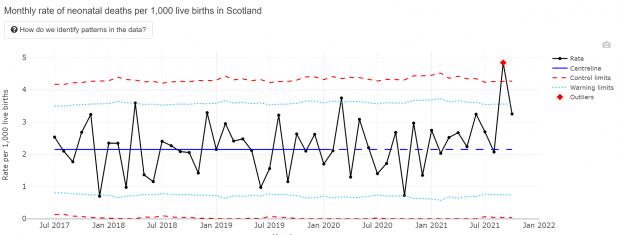No baby deaths among vaccinated mothers who caught Covid during pregnancy, finds study
WOMEN who have Covid-19 towards the end of their pregnancy are vulnerable to birth-related complications, according to Scottish research.
The findings from one of the first national studies on pregnancy and Covid-19, show that pre-term births, stillbirths and newborn deaths are more common among women who have the virus 28 days, or less, before their delivery date.
READ MORE: Transparency key to challenging antivaxxer messages of vaccine danger to babies
The majority of complications, which also include Covid-related critical care admissions, occurred in unvaccinated women.
There were no baby deaths in mothers who had been vaccinated at the time of developing a Covid infection.
 An investigation was launched into an unusual spike in neonatal deaths in Scotland in September, but no link to Covid was found
An investigation was launched into an unusual spike in neonatal deaths in Scotland in September, but no link to Covid was found
The Covid-19 in Pregnancy in Scotland (COPS) study found that the combined rate of stillbirths and neonatal deaths was 23 per 1000 births for infants delivered within 28 days of their mother testing positive for Covid.
That compared to an overall population rate during the pandemic of six per 1000 births, and a rate of four per 1000 for babies delivered within 28 days of their mother receiving a Covid vaccine.
Rates of premature birth – defined as delivery more than three weeks ahead of due date – were also higher following a maternal Covid infection.
The study found that 17 per cent of infants born within 28 days of their mother testing positive for Covid were delivered prematurely, compared to a general population rate of 8% and 8% in the case of infants born within 28 days of their mothers being vaccinated against Covid.
READ MORE: Pregnant women left exposed to Delta wave by ‘mixed messaging’ over vaccine
Experts stressed that it is not possible to say if Covid-19 contributed directly to the deaths or pre-term births, and the data on hospital admissions for pregnant women does not differentiate between those admitted because of Covid and those who tested positive coincidentally.
However, they stressed that it underlined the safety and importance of increasing vaccination coverage among expectant mothers.
COPS co-lead Dr Rachael Wood, a consultant in public health medicine at Public Health Scotland, said: “It is clear that vaccination is the safest and most effective way for pregnant women to protect themselves and their babies from severe Covid-19 disease.
“Vaccination can be given at any stage of pregnancy, so I strongly encourage women who are pregnant, or hoping to become pregnant, to get fully vaccinated as soon as possible.”
It comes after an investigation was launched last year into an unusual spike in neonatal deaths in Scotland, though no link was found to either Covid or vaccinations.
IVF was also recently paused for unvaccinated women.
READ MORE: Neonatal mortality spike ‘not linked to Covid’ in mothers or babies
The COPS study, published in the journal Nature, covered more than 87,000 pregnancies between December 2020 and October 2021.
It found that just 32% of women who gave birth during October 2021 were double-vaccinated compared to 77% of the overall female population aged 18 to 44.
Since the start of Scotland’s vaccination programme, a total of 4,950 cases of Covid-19 have been confirmed during pregnancy, with 77% of these cases in unvaccinated women.
Nearly all (98%) of the women with Covid-19 during pregnancy who were admitted to critical care were unvaccinated.
For all the latest health News Click Here

